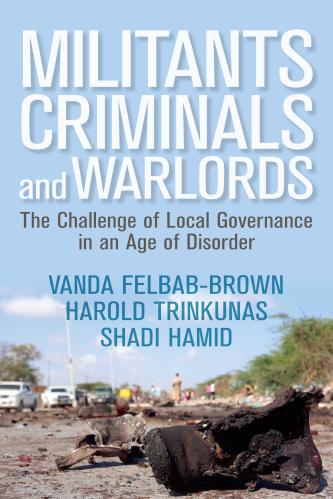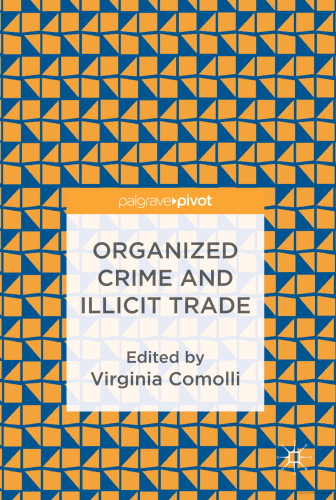When jihadist groups take control of territory and populations, how should governments respond? Responses are too often heavy-handed, and excessively punitive approaches risk backfiring by exacerbating local grievances, conflating victims with perpetrators, and laying the groundwork for future violence.
On October 5, experts from Brookings and the United Nations University’s (UNU) Centre for Policy Research discussed alternative strategies and justice issues for countries affected by jihadist violence. They presented the findings of a UNU report, including three fieldwork-based case studies of Nigeria and Somalia (authored by Brookings Senior Fellow Vanda Felbab-Brown), as well as Iraq. The case studies analyze these states’ approaches to accountability and rehabilitation of those associated with Boko Haram, al-Shabab, and the Islamic State.
Moderator Landry Signé, a David M. Rubenstein Fellow in the Global Economy and Development Program’s Africa Growth Initiative, kicked off the discussion by turning to Cale Salih, a UNU-CPR research officer and editor of the report.
Salih said: “This project essentially sought to understand if, when, and how transitional justice tools—in combination with other conflict resolution tools—could help end conflicts involving major jihadists groups.” The project’s three case studies demonstrate the risks of heavy-handed approaches that treat broad sectors of a jihadi-affected population as suspect, she explained. The case studies also assess the quality and limitations of existing leniency programs, transitional justice mechanisms, and defectors’ programs.
Iraq
Salih outlined key findings of the Iraq case study, authored by Yale Ph.D. candidate Mara Revkin:
- Despite Iraq’s success in re-taking ISIS-held territory, the justice sector struggles with what to do about Iraqis who are suspected of having developed some association with ISIS while living under the group’s control.
- Iraq’s counterterrorism law effectively criminalizes “membership” in ISIS without necessarily requiring that a specific criminal act was committed. But people living under ISIS rule often had to cooperate with the group—at minimum, by paying taxes.
- Iraq’s justice sector conducts arbitrary arrests, involves the military in pre-trial investigations, relies on the testimony of secret informants, rapidly dispenses judgements, and suffers from a weak public defense system that has disadvantaged defendants.
- To address what the study calls “the overbroad penalization of those affiliated with [ISIS],” which “risks fueling new grievances, particularly among the Sunni community,” it recommends enacting legislative reforms that require that a specific criminal act was committed, reviving and amending a previous amnesty law to allow certain low-level ISIS members who did not commit serious crimes to be pardoned, and prioritizing serious crimes over lesser ones.
Somalia and Nigeria
Felbab-Brown outlined several findings from her case studies of Somalia and Nigeria. She argued that these countries’ governments often make little or no distinction between groups such as Somalia’s al-Shabab—or Nigeria’s Boko Haram and the Islamic State—and local populations who had to endure their rule.
Particularly in Nigeria, Felbab-Brown argued, counterinsurgency policies for taking back jihadi-held territory are frequently badly designed. Given the lack of holding forces, the Nigerian military routinely resorts to sending all people who did not have a chance to “defect”—i.e. escape the groups’ rule—to detention camps. Problematically, she reports, there is often no adequate screening process in liberated areas to determine who should actually be placed in a detention center, with entire communities thus relocated into detention. Detainees, including women and children, may then languish in detention camps for years, according to Felbab-Brown, and often under abusive conditions. Such a policy, she added, further exacerbates an already intense ostracism of those who had to live under Boko Haram’s rule. Many Nigerians see them, including women who were forced to marry Boko Haram members and children, as “bad” and “corrupted,” not trustworthy enough for societal reintegration.
Some leniency programs are nonetheless emerging in Nigeria, such as “Operation Safe Corridor.” This defectors’ program seeks to provide rehabilitation to low-risk, male, “repentant” Boko Haram fighters. However, to qualify, Felbab-Brown explained, they must actually run away from Boko Haram-held territories and give themselves up to the authorities. Those who did not have an opportunity to run away before being liberated do not qualify, and will be sent to detention camps.
In Somalia, a similar defectors’ program was pioneered several years ago, Felbab-Brown explained. There, defectors are classified as low- and high-risk as well as high-value. Yet defectors who are not high-value do not know a priori whether they will be classified as high-risk or low-risk and hence what fate will await them. While at least on paper the screening process has improved, according to Felbab-Brown, it still lacks transparency. Those deemed low-risk are sent to de-radicalization facilities sponsored by international governments or the United Nations. High-risk actors are tried in military courts and face a high risk of being sentenced to death and executed, with little transparency or due process, she explained.
The deradicalization and rehabilitation process for low-risk defectors, while also significantly improved, still suffers from limitations, including the lack of an overall legal framework for amnesty measures and punitive steps; support for women who lived under al-Shabab rule or married al-Shabab members; employment opportunities after defectors exit facilities; and robust monitoring and evaluation. Felbab-Brown also explained that sometimes victims of jihadist violence see former fighters as benefitting from international and government support, while victims continue to suffer amidst poverty and war devastation.
Similarly, there is in fact considerable discomfort in Somalia, such as among civil society, including women’s groups, over the lack of accountability for high-value defectors. Deals negotiated between the government of Somalia and such al-Shabab commanders are non-transparent and often amount to complete impunity, even for serious crimes. Felbab-Brown described the 2017 case of al-Shabab commander Mukhtar Robow—who was accused of serious human rights violations, targeted by U.S. counterterrorism efforts, offered a secret deal with the Somali government to encourage other defections, and apparently given temporary freedom to enter politics—is illustrative.
Felbab-Brown stressed that transitional justice tools, such as leniency programs and amnesties, must not ignore victims’ rights or foster impunity, often the core causes of militancy and the lack of government legitimacy. Furthermore, she concluded, for transitional justice measures to be fully effective, they must be expanded to include accountability for human rights abuses committed by militaries and anti-jihadist militias.
Look to the roots
Finally, independent human rights expert Lana Baydas argued that the international community needs to better reconcile its commitment to human rights with its mandates to counter terrorism and violent extremism. Since 9/11, she conveyed, many countries have felt compelled to prioritize highly punitive and counterproductive, militaristic approaches to extremist groups. Countries may worry that adopting a different approach could jeopardize international financial or military support, or even subject them to sanctions.
Baydas also highlighted that there is no agreed international definition of terrorism or violent extremism, which can become a problem when policies to counter them are implemented. Although civil society actors contribute to counterterrorism and preventing violent extremism, many governments are unwilling to meaningfully engage with these actors, Baydas said, hampering locally-driven trust-building and reconciliation efforts. Governments also often exploit counterterrorism policies and frameworks for their own undemocratic political purposes, such as repressing political opposition or civil society. “While combating the direct threat of violent extremism remains critical to prevent widespread death and destruction, military and heavy-handed operations in isolation do not end terrorist movements,” Baydas stated. Instead, she emphasized the need to address root causes of violence.
The U.N. University’s “Limits of Punishment” volume contains additional detailed information on a range of related topics: transitional justice approaches and leniency programs and their application in conflict settings involving jihadist groups, including prioritizing the prosecution of severe crimes and offenders; design of conditional amnesties to avoid contributing to impunity; and lessons from other cases, such as Northern Ireland, Rwanda, Uganda, and Colombia.
The Brookings Institution is committed to quality, independence, and impact.
We are supported by a diverse array of funders. In line with our values and policies, each Brookings publication represents the sole views of its author(s).






Commentary
Terrorists next door? Experts discuss how to respond when communities are overtaken by terrorist groups
October 25, 2018